Critical Thinking
> Turok23
> Disinformation
Critical Thinking. Critical Thinking. Critical Thinking. Critical Thinking. Reason and validity. Thinking Traps. Pensée critique. Question to spark critical thinking. Critical Thinking Model 1. To Analyze Thinking We Must Identify and Question its Elemental Structures Standard: Clarityunderstandable, the meaning can be grasped.
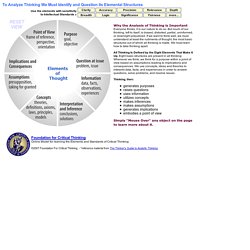
Esprit critique et oral. Esprit critique / Fake news ressources. Scepticisme scientifique. Esprit critique. Multiple Intelligences. Debate. Éducation à l'image.
Kialo Edu - The tool to teach critical thinking and rational debate. In realtà non si vuole realmente argomentare ... proprio quando ce ne sarebbe più bisogno. Steven Pinker : "L'irrationalité actuelle ne signifie pas que notre espèce débloque"
Il est l'un des penseurs les plus influents de la planète.

Psychologue cognitiviste et professeur à Harvard, Steven Pinker publie Rationalité (Les Arènes), un vibrant plaidoyer pour la raison dans une époque où la subjectivité est reine. En exclusivité pour L'Express, l'intellectuel préféré de Bill Gates, auteur des best-sellers La part d'ange en nous et Le triomphe des Lumières, explique comment la pensée critique a amené des progrès spectaculaires, pourquoi il ne faut pas désespérer de l'actuelle vague de complotisme et d'obscurantisme et de quelle manière, individuellement et collectivement, nous pouvons tous devenir plus rationnels. Entretien. L'Express : Selon vous, la rationalité est le principal moteur des progrès que vous avez illustrés dans vos livres Le Triomphe des Lumières et La Part d'ange en nous. Sur quoi vous basez-vous ?
Offre limitée. 2 mois pour 1€ sans engagement Il y a de quoi être alarmé. "La plupart d'entre nous sommes parfaitement rationnels dans notre vie réelle"
249 Bloom's Taxonomy Verbs For Critical Thinking. Bloom’s Taxonomy’s verbs–also know as power verbs or thinking verbs–are extraordinarily powerful instructional planning tools.
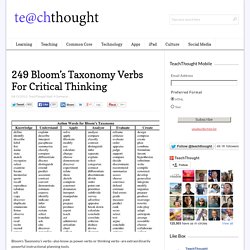
In fact, next to the concept of backwards-design and power standards, they are likely the most useful tool a teacher-as-learning-designer has access to. Why? They can be used for curriculum mapping, assessment design, lesson planning, personalizing and differentiating learning, and almost any other “thing” a teacher–or student–has to do. For example, if a standard asks students to infer and demonstrate an author’s position using evidence from the text, there’s a lot built into that kind of task.
Responsible thinking web sites. Critical Thinking sites: These sites discuss critical thinking and common errors in reasoning.
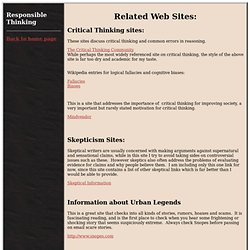
For the Love of Wisdom – A Blog of Freethought & Philosophy. Guida pratica al pensiero – Hic Rhodus. La Toupie : Accueil. Links - The Skeptics' Guide to the Universe. Critical Thinking: Where to Begin. How to improve your Critical Thinking skills: Interview with Dr. Gerald Nosich – Life Lessons. In this article I interview an expert on Critical Thinking, Dr.
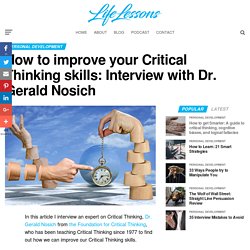
Gerald Nosich from the Foundation for Critical Thinking, who has been teaching Critical Thinking since 1977 to find out how we can improve our Critical Thinking skills. In this article you will learn: Let’s start at the beginning… Michael: What is Critical thinking? Dr. One it’s reflective.
Critical and Creative Thinking. The imparting of knowledge (content) and the development of thinking skills are accepted today as primary purposes of education. The explicit teaching and embedding of critical and creative thinking throughout the learning areas encourages students to engage in higher order thinking. By using logic and imagination, and by reflecting on how they best tackle issues, tasks and challenges, students are increasingly able to select from a range of thinking strategies and use them selectively and spontaneously in an increasing range of learning contexts.
Activities that foster critical and creative thinking should include both independent and collaborative tasks, and entail some sort of transition or tension between ways of thinking. The learning area or subject with the highest proportion of content descriptions tagged with Critical and Creative Thinking is placed first in the list. F-6/7 Humanities and Social Sciences (HASS) 7-10 History 7-10 Geography. The Critical Thinking Skills Cheatsheet [Infographic]
Critical thinking skills truly matter in learning.
![The Critical Thinking Skills Cheatsheet [Infographic]](http://cdn.pearltrees.com/s/pic/th/critical-thinking-cheatsheet-143956726)
Why? Because they are life skills we use every day of our lives. Everything from our work to our recreational pursuits, and all that’s in between, employs these unique and valuable abilities. Consciously developing them takes thought-provoking discussion and equally thought-provoking questions to get it going.
How to Think Critically. Fake News. Les illuminés. The Role of Emotional Thinking in Critical Thinking — Work Faster. Work Smarter.
Ladder of Inference. Les niveaux de preuve. The Information Literacy User’s Guide: An Open, Online Textbook. Introduction In 2010, a textbook being used in fourth grade classrooms in Virginia became big news for all the wrong reasons.

The book, Our Virginia by Joy Masoff, had caught the attention of a parent who was helping her child do her homework, according to an article in The Washington Post. Carol Sheriff was a historian for the College of William and Mary and as she worked with her daughter, she began to notice some glaring historical errors, not the least of which was a passage which described how thousands of African Americans fought for the South during the Civil War. Further investigation into the book revealed that, although the author had written textbooks on a variety of subjects, she was not a trained historian.
Esprit critique. Présenté à la fois comme un enjeu et une condition de la citoyenneté, le développement de l'esprit critique est de plus en plus souvent mentionné comme objectif de formation : « Le développement de l'esprit critique est au centre de la mission assignée au système éducatif français.
To think critically, you have to be both analytical and motivated. In a world where accusations of "fake news" are thrown around essentially at random, critical thinking would seem to be a must.
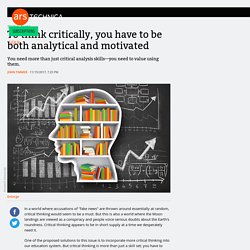
But this is also a world where the Moon landings are viewed as a conspiracy and people voice serious doubts about the Earth's roundness.
Overcoming Obstacles to Critical Thinking. The ability to think critically is one skill separating innovators from followers.
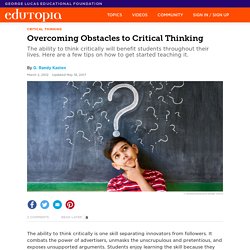
It combats the power of advertisers, unmasks the unscrupulous and pretentious, and exposes unsupported arguments. Students enjoy learning the skill because they immediately see how it gives them more control.
Defining Critical Thinking. It entails the examination of those structures or elements of thought implicit in all reasoning: purpose, problem, or question-at-issue; assumptions; concepts; empirical grounding; reasoning leading to conclusions; implications and consequences; objections from alternative viewpoints; and frame of reference.
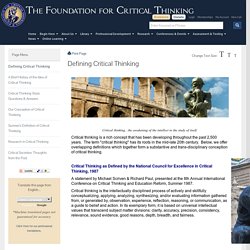
Critical thinking — in being responsive to variable subject matter, issues, and purposes — is incorporated in a family of interwoven modes of thinking, among them: scientific thinking, mathematical thinking, historical thinking, anthropological thinking, economic thinking, moral thinking, and philosophical thinking. Critical thinking can be seen as having two components: 1) a set of information and belief generating and processing skills, and 2) the habit, based on intellectual commitment, of using those skills to guide behavior.
Rhetorical Triangle. Mental Models: The Best Way to Make Intelligent Decisions (~100 Models Explained)
This guide explores everything you need to know about mental models. By the time you’re done, you’ll think better, make fewer mistakes, and get better results.
The Art of Having an Informed Opinion. “What the pupil must learn, if he learns anything at all, is that the world will do most of the work for you, provided you cooperate with it by identifying how it really works and aligning with those realities. If we do not let the world teach us, it teaches us a lesson.” — Joseph Tussman The first thing they always do is tell you what they think. When someone has an opinion about everything, they want to share it with you.
Yes, Your Opinion Can Be Wrong. Thursday, July 23, 2015 at 6 a.m.
I have had so many conversations or email exchanges with students in the last few years wherein I anger them by indicating that simply saying, "This is my opinion" does not preclude a connected statement from being dead wrong. It still baffles me that some feel those four words somehow give them carte blanche to spout batshit oratory or prose. And it really scares me that some of those students think education that challenges their ideas is equivalent to an attack on their beliefs.
The Selective Laziness Of Human Reasoning : 13.7: Cosmos And Culture.
Gary Waters/Getty Images/Ikon Images. Méthode hypercritique. Un article de Wikipédia, l'encyclopédie libre. La méthode hypercritique est une méthode d'argumentation, consistant en la critique systématique et excessive[1] des moindres détails d'une affirmation opposée ou de ses sources.
How to Think: The Skill You've Never Been Taught.
No skill is more valuable and harder to come by than the ability to critically think through problems. Schools don’t teach you a method of thinking. Thinking is one of those things that can be learned but can’t be taught. When it comes to thinking the mind has an optimal way to be operated.
Deductive and Inductive Arguments
A deductive argument is an argument that is intended by the arguer to be (deductively) valid, that is, to provide a guarantee of the truth of the conclusion provided that the argument's premises (assumptions) are true. This point can be expressed also by saying that, in a deductive argument, the premises are intended to provide such strong support for the conclusion that, if the premises are true, then it would be impossible for the conclusion to be false.
An argument in which the premises do succeed in guaranteeing the conclusion is called a (deductively) valid argument. If a valid argument has true premises, then the argument is said to be sound. Here is a valid deductive argument: It's sunny in Singapore.
Reasoning Resources. While people generally think of an argument as a fight, perhaps involving the hurling of small appliances, this is not the case-at least as the term is used in philosophy. In philosophy, an argument is a set of claims, one of which is supposed to be supported by the others.
The Validity and Soundness of Deductive Arguments. Ne pas traiter l’autre de petite merde (vidéo)
The Value of Grey Thinking. One of the most common questions we receive, unsurprisingly, is along the lines of What one piece of advice would you recommend to become a better thinker?
The question is kind of cheating.
Know Your Sources. Evaluating Internet Research Sources. Robert Harris Version Date: October 11, 2018 Previous: August 16, 2018, December 12, 2016; January 21, 2015, December 27, 2013; November 6, 2013; Nov. 22, 2010 and June 15, 2007. Suggested Rules of Investigation for Unusual Claims. Types of Reasoning. Theories about trust. Theories about memory.
Theories about meaning. Teaching critical thinking. Historians Fallacies Toward A Logic Of Historical Thought : David Hackett Fischer. Biais cognitifs, bulles, et filtres informationnels. Focus 1 : Petit guide pratique des biais cognitifs à l’usage indispensable des dirigeants. Focus 2 : Ces biais qui nous gouvernent… Quelques astuces pour s’en prémunir.
Argument Mapping. ARGUMENT MAPPING. The Ideological Turing Test: How to Be Less Wrong – The Polymath Project. Croire, savoir, prouver. Synthèse. The Mistake You Make in Every Political Argument. How to Disagree. How Can We Talk? About What Is Essential?
Inquiry Mind-set, HOTS, Critical Thinking/Questioning. How biased is your news source? You probably won’t agree with this chart. You Are Not So Smart.
Algo_study. 5 tips to improve your critical thinking - Samantha Agoos. Elements of Effective Thinking - Farnam Street. Information literacy skills. Analfabetismo applicativo. La parola di un esperto vale più di quella degli altri. People who think their opinions are superior to others are most prone to overestimating their relevant knowledge and ignoring chances to learn more. People in higher social class have an exaggerated belief that they are better than others. Information Literacy. The Trick To Thinking Clearer and Better – Personal Growth.
How to get Smarter: A guide to critical thinking, cognitive biases, and logical fallacies. Franca D'Agostini - Diritti aletici. Critical Thinking: Where to Begin. How to Train Your Mind to Think Critically and Form Your Own Opinions. Why “Both Sides” of a Story Aren’t Enough. How to Teach Critical Thinking. Yes, Your Opinion Can Be Wrong. 5 Common Mental Errors That Sway You From Making Good Decisions - James Clear - Pocket. Philosophy and Logic. List of paradoxes. Some paradoxes - an anthology. Logical Paradoxes. Polanyi’s paradox. Argomentazione.
ARGOMENTARE. Pensierocritico.eu. Pensiero Critico: strumenti e risorse sull'argomentare - come convincere gli altri che abbiamo ragione?






![The Critical Thinking Skills Cheatsheet [Infographic]](http://cdn.pearltrees.com/s/pic/th/critical-thinking-cheatsheet-143956726)



